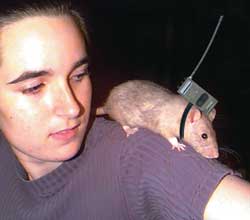 It this precise moment, you wouldn't want to be in the shoes of this robotic rat with electrodes sticking out of its brain which went through field trials recently to successfully negotiate a maze while being steered by a remote control joystick. As far as we know this is the first time in rodent history that a sentient being has been employed as an all-terrain vehicle.
It this precise moment, you wouldn't want to be in the shoes of this robotic rat with electrodes sticking out of its brain which went through field trials recently to successfully negotiate a maze while being steered by a remote control joystick. As far as we know this is the first time in rodent history that a sentient being has been employed as an all-terrain vehicle. Scientists at New York's Downstate Medical Centre in Brooklyn, according to an article in this week's issue of the journal Nature, have trained lab rats to make port or starboard turns by tickling their port or starboard whiskers respectively, and then rewarding them if they obey (and I quote) "with a pulse of euphoria in their pleasure centre."
Nature magazine does not divulge which body part of the said mice these pleasure centres are located in, or whether the scientists monitoring the volunteer roborats also treated themselves to pulses of euphoria in their pleasure centres. But this is how it works: strapped on the rat is a tiny knapsack with an antenna for receiving radio signals in the very high frequency range and a small microprocessor that sends electrical pulses to its brain that gives the rat the illusion that it is having a good time when in actual fact it is getting an acupuncture of its cerebellum.
Asked about the ethics of all this poking around, the Brooklyn scientists denied that it was an infringement on the basic rights of rats, and maintained that during the experiments the rats got written guarantees to life, liberty and the pursuit of happiness.
Here in Nepal, our main goal should be to find the appropriate applications for these rapid strides in science and technology. By this, I mean we should see if we can't install some of these sophisticated pieces of equipment on our street dogs and turn them into traffic cops. Of course, the Hounds of Handigaon will need some training, and we will need to do something about canine Robo Cops being temporarily distracted by the passage through the Singha Durbar intersection of the Municipality's garbage truck.
However, with practice, we are confident that our robotic mongrels will be alert enough to know when southbound traffic is backed up from the statue of King Prithvi Narayan Shah the Great all the way across town to the statue of Voice Emperor Narayan Gopal. Then, all it will take is a short electromagnetic signal on the dog's right whiskers to trigger his motor receptors to lift his right hind leg. Oops, sorry. Wrong electrode. Let's try this blue wire here on his left whisker. Drat, why is he sitting on his butt and offering me his left paw?
All right, there are still some teething problems with turning our street dogs into Robo Cops, but as science advances we will lick this problem and can move on to the more urgent task of installing these devices on to the skulls of humans who hold high office. Politicians equipped with electrodes attached to the greed centres of their brains have, in recent field trials, successfully rebuffed offers for "breakfast money" from tycoons.
When the bribe offer is made, scientists manning a joystick from a relatively safe distance of 100 yards, send a signal by remote control to the public servant's pleasure centre and transmit him a quick multiple orgasm. Nine out of ten times that this experiment has been tried out in the lab, the official has turned down a hefty bribe. So there we have it, the answer to the problem of graft: replace greed with lust.



